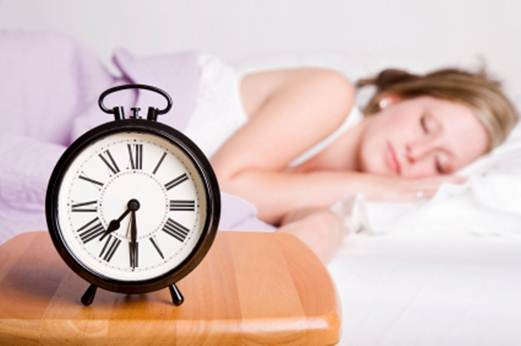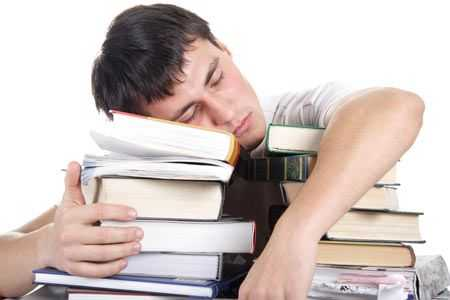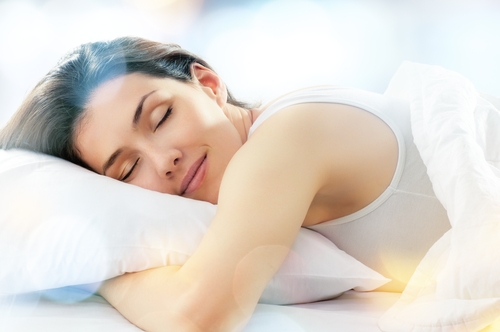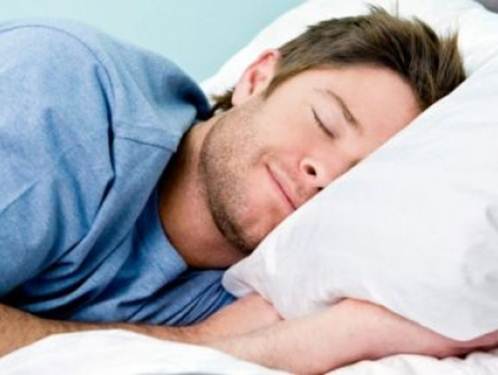No, you’re not dreaming. Experts now
claim a full night’s shut-eye is overrated. But if that’s so, what’s behind our
‘exhaustion epidemic’? Andréa Childs investigates
On a recent night out with friends, our
conversation followed its usual pattern: we caught up on each other’s work
moans over the starters, discussed our love lives while we chomped our mains,
and reminisced about old times as we shared dessert. But when the waiter asked
whether we wanted coffee, talk turned to sleep – or lack of it. Claire’s
insistence that even a decaf was out of the question because she was so
desperate for a good night’s rest (‘I almost fell asleep in the shower!’)
turned into a full-on competitive scaling up of shut-eye deprivation. To hear
us talk of drifting off in front of The Bridge, nodding off over our
computer keyboards and struggling to get out of bed in the morning, you’d think
we’d all been training for ultra-marathons or working on building sites in our
spare time.

Do
We Really Need 8 Hours of Sleep?
Actually, we’re a group of fit and healthy
women juggling the usual demands of work and home life. Yes, some of us find a
good night’s rest more difficult to achieve than others, but are we really
suffering from a ‘exhaustion epidemic’ – a phrase coined by Dr Frank Lipman,
author of Revive! End Exhaustion and Feel Great Again (Hay House,
$16.5)? Or is the eight-hour rule just another health myth, up there with
drinking two litres of water a day?
‘Our society runs on “Red Bull bravado” –
the idea that sleep is for wimps. It’s exaggerated by our 24/7 culture, where
mobile phone have infiltrated our rest hours and there’s an emphasis on
responding immediately to any social media updates’, says Dr Rob Meadows,
sociologist and sleep researcher at the University of Surrey. ‘’On the flip
side, sleep has become political, with the thinking that being well-rested is
good for productivity – some companies have ever introduced napping pods for
their workers.’ Add in headlines that link lack of sleep with serious health
issues, from weight gain to breast cancer, and it’s no wonder we’re confused –
and more anxious about nodding off than ever.
But an increasing number of experts are
saying that nightmares about sleep may be unnecessary. ‘Most adults get enough
sleep, and claims that sleep deprivation is contributing to obesity and
diabetes are overblown,’ says Professor Jim Horne, a sleep researcher at
Loughborough University. ‘Yes, the studies show that if you sleep for just five
hours per night, you’ll gain a kilogram of fat every year but, to put it in
perspective, you could lose weight at the same rate by reducing your food
intake by 30 calories per day – that’s about the same as one bite of a muffin.’
Prof Horne also says the association between poor sleep and diabetes is
‘overcooked’. The research artificially restricted people to four hours of
sleep per night, and they then began to show the beginnings of glucose
intolerance and metabolic syndrome – both precursors to type 2 diabetes.
However, what wasn’t widely reported was that the effect was reversed after one
night of ‘normal’ sleep.

the
studies show that if you sleep for just five hours per night, you’ll gain a
kilogram of fat every year
However, other sleep researchers continue
to be concerned. Clinical psychologist Professor Colin Espie is the director of
the sleep research laboratory at the University of Glasgow and co-founder of
Sleepio (sleepio.com), an online service using cognitive behavioural therapy to
tackle sleep disorders. ‘Sleep is a crucial biological phenomenon, not a
lifestyle choice, and chronic poor sleep is going to put you at increased risk
of health problems such as cancer, heart disease and depression,’ he says. But
before you dive under the duvet, it’s worth noting that Prof Espie also says
only 10% of us have clinically diagnosed insomnia, and just 20% of us suffer
from sleep problems. We do sleep fewer hours than our agricultural ancestors who
led physically demanding lives and timed their sleep with the rising and
setting of the sun, but despite how we might feel, for 70% of us, sleep may not
be an issue at all.
‘Most tiredness isn’t actually to do with
sleep – it’s a reaction to a boring job, to stress, to not winning the
Lottery…’ says sleep expert Dr Neil Stanley. ‘If you feel awake rather than
sleepy during the day, you’re getting enough rest.’ According to Dr Stanley,
the amount we sleep is genetically determined, as is whether we’re more early
bird than night owl. ‘Anything between three and 11 hours is normal, so if
you’re a six-hours-a-night person, staying in bed for longer is a waste of
time,’ he says. And while we can set our alarms to wake us up in the morning,
or to go bed before we feel tired, we can’t change our natural underlying sleep
pattern. ‘It takes an average of 20 minutes to fall asleep, then we alternate
between light and deep sleep over a 90-minute cycle’, explains Dr Stanley.
‘It’s often being disturbed from deep sleep by the alarm or needing a wee that
makes us feel groggy and out of sorts when we wake, not a lack of sleep in
general.’
Prof Espie suggests keeping a sleep diary
over ten days and recording the hours you spend in bed and how many of those
are actually spent asleep. Depending on how energized or drained you feel
during the day, you should add or subtract sleeping time until you find your
personal sleep prescription; the experts call it ‘sleep efficiency’. (Fill out
the questionnaire at greatbritishsleepsurvey.com and you’ll get a personalized
sleep report.) A quick look in the mirror may give us the same information.
‘Along with diet and exercise, sleep is part of our wellbeing triangle,’ says
Dr Stanley. ‘Get a good night’s sleep and not only will you feel great, you’ll
also look better. Beauty sleep isn’t a myth; without it skin condition suffers
and we get dark shadows under our eyes.’

Perhaps most revealing is research that
shows if we are given an extra hour in the day, few of us would actually use it
for a little extra shut-eye. A quick poll of my friends backed this up: ‘I’d
read or go for a run,’ says Emma, while my mate Jane agrees: ‘When I’m on my
death bed, I won’t be thinking, “I never did finish writing that novel, but at
least I had a good kip!”’ She may be on to something. According to Dr Dawn
Harper, there are things that are far more effective than sleep for picking us up
and making us feel – especially if it’s lifestyle stress rather than true
tiredness that’s getting us down. ‘It sounds counterintuitive when you’re
feeling lethargic, but exercise has been proven to relieve anxiety and increase
energy,’ she says. ‘If you can do it outdoors, even better – daylight helps to
regulate our levels of sleep-boosting melatonin, so we feel active in the day
and sleepy at night. And finally, give yourself 30 minutes of me-time every
day. A mental break to read, watch trashy TV or chat to a friend will give you
a boost that no power nap ever can.’
One thing’s for sure: on my next night out,
I’ll be boasting about my energy, rather than complaining about sleep
deprivation. Exhaustion epidemics are so not worth the competiton…
When sleep’s essential
Sometimes, a good night’s sleep isn’t a
luxury, it’s a necessity, says independent sleep expert, Dr Neil Stanley.
Here’s when it really matters.

Sometimes,
a good night’s sleep isn’t a luxury, it’s a necessity
§
If you’re trying to lose weight ‘Sleep
deprivation increases appetite and creates a craving for sugary and fatty
foods,’ says Dr Stanley. ‘Getting plenty of sleep will help you stick to your
eating plan.’
§
If you’re training for a sports event ‘Good
sleep improves accuracy, speed and endurance. It also helps you repair after
injury; while you’re 35% more likely to get a sports injury if you’re
sleep-deprived.’
§
If you’re going on a date ‘Researchers in
Edinburgh took photographs of subjects who’d had a good night’s sleep, then
napped them again after a night’s sleep deprivation. When the photographs were
rated for attractiveness, the well-rested pics scored best.’
Super-size your sleep
Put the kettle on
Participants in a recent sleep study
reported failing asleep quicker and having a better night’s rest after just one
cup of passionflower tea before bed, $5.5 (indigo-herbs.co.uk).
Power down
Blue light, emitted by mobiles and TVs,
suppresses the production of melatonin, so unwind with a book before bed
instead.
Switch on the stereo
Meditation and hypnosis CDs lull you into a
hyper-relaxed state. Try I Can Make You Relax by Amanda Stanhope, $22
(amazon.co.uk).
Wake upon time
Zeo Sleep Manager, $133.5 (myzeo.co.uk),
monitors your sleep cycles and wakes you during your lightest one, no snooze
button required.
Let the sunshine in
As soon as you wake up, throw open the
curtains and turn on the lights to tell your brain it’s time to wake up.
Do something active
It doesn’t need to be Zumba-active, but
stimulating your brain in the morning boosts energy naturally. Schedule your
creative tasks for first thing and save less interesting ones for the
afternoon.